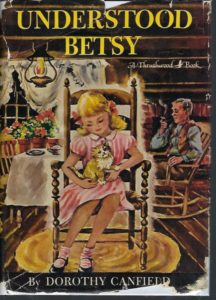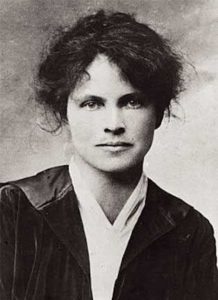I don’t remember exactly when I first read Understood Betsy by Dorothy Canfield Fisher. I was eight or nine years old, and I seem to recall a Scholastic Book Club edition. It might have come from the neighbor next door, two years older and a prolific reader. She gave away books she finished reading, and I was often the happy recipient.
Almost 40 years later, I was at one of St. Louis’s book fairs, looking for old editions of The Hardy Boys, when I spotted an old edition of Understood Betsy. I remembered the story, and into my shopping cart it went. It has sat on a bookshelf, unread, for almost 20 years. And then I picked it up and read it.
It tells the story of Elizabeth Ann, a little girl living with aunts in a Midwestern city. Both of her parents have died, and she’s been reared by dear Aunt Frances for almost all of her nine years. Aunt Frances is a doting character, so doting that she nearly smothers the little girl in love and affection. She tells Elizabeth Ann about her distant relatives, including the dreaded Putney cousins in Vermont.

It’s officially a “girl’s story,” but it has themes and lessons for all readers. Change, particularly big change, can be scary, but it can be met head on, and something good can come from it. Don’t judge people by what you’ve heard or from first appearances. You can learn new things, which in Betsy’s case include churning butter, driving a team of horses, teaching younger children, saving a little girl from a precarious hole in the ground, and finding a way to make the money needed for a train trip home from the county fair when her ride forgets her.
It’s a story about growing up and becoming responsible, a theme that will never die out and applies to all of us.
Dorothy Canfield Fisher (1879-1958) was an educator, social activist, author of fiction and nonfiction books, friend of Willa Cather, Book-of-the-Month Club selection panel member from 1925 to 1951, artist, mother, and wife. She earned a doctorate in Romance Languages from Columbia University, and she was the first woman to receive an honorary degree from Dartmouth University (she also received honorary degrees from the University of Nebraska, Swarthmore, Smith College, Middlebury College, University of Vermont, and Ohio State University).

Dorothy Canfield Fisher
In addition to her six short story collections, Canfield Fisher also wrote numerous novels for adults and children. The subjects of her nonfiction books include education, the Montessori method (Betsy’s school in rural Vermont is implicitly a Montessori school), Paul Revere, the Constitution, rhetoric and composition, work, and tourism. She also translated Giovanni Papini’s Life of Christ from the Italian.
Of all her writings and accomplishments, Understood Betsy is the book Canfield Fisher is best remembered for. It’s also the one that has remained in print since its first publication in 1916. It may be mostly set on a rural Vermont farm before America’s entry into World War I, but it is a story about self-reliance that’s timeless.
Photo by Tim Green, Creative Commons, via Flickr. Post by Glynn Young.
__________________________

“I require all our incoming poetry students—in the MFA I direct—to buy and read this book.”
—Jeanetta Calhoun Mish
- Longfellow’s “Paul Revere’s Ride”: Creating a National Legend - April 17, 2025
- Poets and Poems: Katie Kalisz and “Flu Season” - April 15, 2025
- Poets and Poems: Michelle Ortega and “When You Ask Me, Why Paris?” - April 10, 2025

Jody Collins says
Oh, I love learning about ‘new’ old classics….especially literature for children–which is all of us. Thank you Glynn!